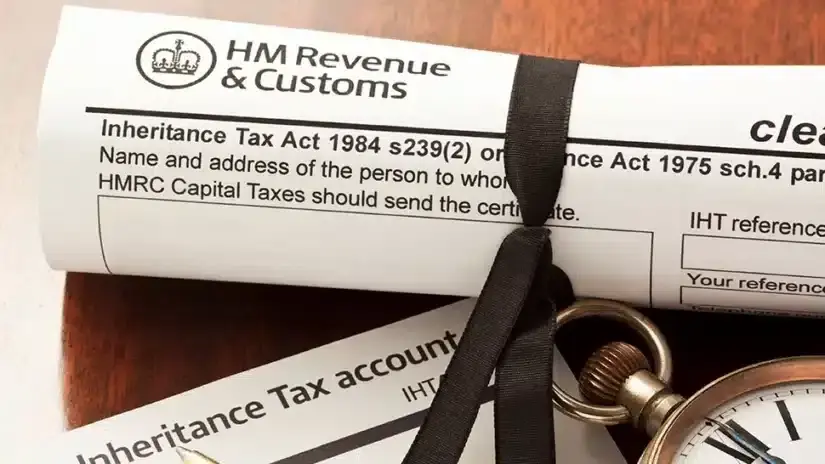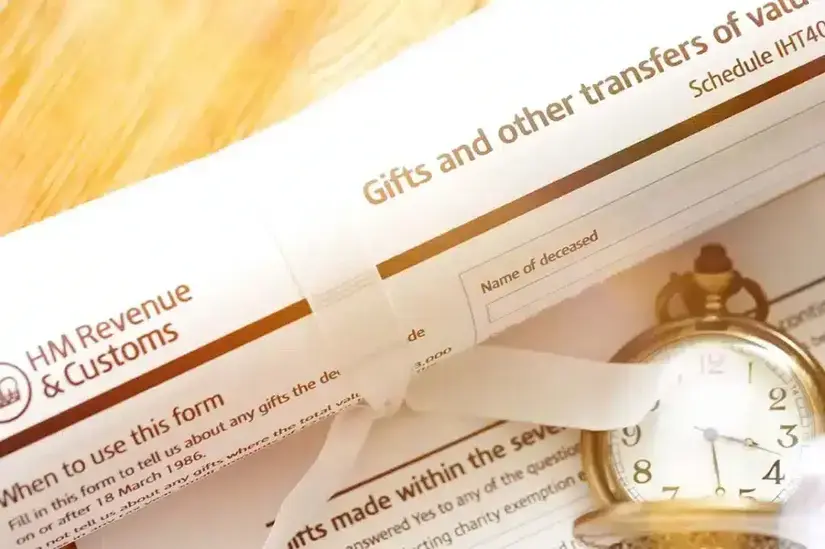Inheritance Tax for UK Expats – that will be the topic of today’s article. Whilst this article isn’t formal tax advice, we have done our best to make it accurate at the time of writing.
If you are looking to invest as an expat or high-net-worth individual, which is what I specialize in, you can email me (advice@adamfayed.com) or WhatsApp (+44-7393-450-837).
Many British expats living overseas wrongly think they are safe from inheritance tax just because they aren’t UK tax-residents.
Table of Contents
Introduction
Inheritance tax for UK expats is something you should know especially if you have UK-based assets.
People whose domicile is still in the UK but who are expats living abroad are subject to inheritance tax. It also has an impact on UK residents who don’t have a permanent residence but have UK-based assets.
Numerous elements, such as your birthplace, the birthplace of your father, and the location of your assets, affect your country of domicile.
It’s not enough to simply demonstrate that you no longer live in the UK when changing your domicile; it can be a challenging process.
An experienced financial adviser can advise you on how to prove this to the UK tax system, such as by giving up your passport, if necessary. The UK tax system requires proof that you do not intend to return to the UK.
When preparing your taxes, it’s important to keep in mind that there are ways to shield your assets from inheritance tax, such as making gifts and transferring pensions.
What is Inheritance Tax?
A tax called inheritance tax is imposed on wealth that is passed down through inheritance, such as cash, real estate, and personal property.
An “estate” is the term typically used to describe the totality of a person’s wealth. Upon a person’s passing, inheritance tax is assessed based on how much and where they have left their estate to each beneficiary, as well as where they have left them.
In the UK, this tax is paid by the deceased person’s estate (which is managed by the will’s executor, if there is one, or the estate administrator, if not), and the remaining assets are given to the beneficiaries.
Different systems exist in some nations, such as the French succession tax system, where the beneficiaries receive the entire inheritance and are responsible for paying any taxes associated with it.
Since there are ways to reduce or avoid it through tax planning, inheritance tax is frequently referred to as a “voluntary tax.” This holds true whether or not you reside in the UK, but for expatriates, domicile is a crucial consideration when planning for inheritance tax for UK expats.
Your domicile status can be satisfactorily tested in a variety of ways, but you’ll need professional assistance. If you make a mistake, your heirs might be hit with a hefty tax bill.
A specialist in this field can assist you in determining your domicile status, the interactions between inheritance tax and local inheritance tax in your country of residence, and the steps you can take to shield your heirs from these taxes.
Keep in mind that you might not be handling this yourself. Your executor and/or heirs may be required to demonstrate to HMRC why your estate shouldn’t be subject to UK inheritance tax. As a result, you should leave all of your paperwork organized for them.

What are the limits for inheritance tax?
The threshold for inheritance tax in the UK is currently set at £325,000, but depending on the situation, it may rise to a maximum of $1 million per couple. Although other nations have different thresholds, the majority will allow at least some inheritance to be transferred without paying inheritance taxes.
What is the inheritance tax rate?
All inheritances in the UK that exceed a £325,000 threshold are subject to inheritance tax. This is also known as the allowance for inheritance tax.
If the deceased had full or partial ownership of their home and left it to their own child, foster child, stepchild, or grandchild, the allowance increases to £500,000. With some modifications and exceptions, inheritance tax for UK expats is assessed at a rate of 40%.
What are the various inheritance tax rates?
As was already mentioned, the standard rate of inheritance tax in the UK is 40%.
For any gifts made within the seven years preceding a person’s death, the rate gradually decreases; the conditions for these gifts are described in the exceptions section of this page.
The following are the individual taper rates for gifts corresponding to the period of time between death and gift:
- Less than 3 years: 40%
- 3 to 4 years: 32%
- 4 to 5 years: 24%
- 5 to 6 years: 16%
- 6 to 7 years: 8%
- 7 or more years: 0%
Additionally, the remaining estate is subject to 36 percent rather than 40 percent taxation if more than 10% of the decedent’s estate is left to charity. When compared to not giving to charity at all, this can frequently result in a lower overall financial commitment.

What are the exemptions from inheritance tax?
If all of the wealth over the inheritance tax allowance is left to a person’s spouse or civil partner, no inheritance tax is due.
The inheritance tax threshold can be as high as £1 million per couple if the family home is left to a child, foster child, stepchild, or grandchild if the deceased person’s estate is less valuable than the inheritance tax allowance and any remaining allowance can be added to the allowance of their spouse or civil partner.
If all assets above the inheritance tax exemption are left to a charity or a local amateur sports team, no inheritance tax is due.
If you leave your house to your child, foster child, stepchild, or grandchild, the inheritance tax exemption rises to £500,000, as was previously mentioned.
Gifts
If the person leaving the gift lives at least seven years after the date of the gift, they may give their family a tax-free gift of up to any amount. The gift recipient might be subject to inheritance tax if the donor passes away before those seven years are up.
If the person who made the gift passes away before the seven-year window has closed, the gift, which was made in this manner, is known as a Potentially Exempt Transfer and changes to a Chargeable Transfer.
Every person in the UK is entitled to an annual gift allowance, which allows them to give away up to £3,000 in assets or cash each year without incurring inheritance tax. It is possible to carry over any extra, unused annual gift allowance to the following tax year, but this is only permitted once; if it is not used in the new tax year, it is lost.
Some gifts can be given at any time without incurring inheritance tax because they are not subject to the annual gift allowance. This includes any gifts made to someone who hasn’t already received one from your annual gift allowance that are £250 or less.
Additionally, exempt are wedding gifts up to the following limits:
- Up to £5,000 given to one’s own child.
- Up to £2,500 given to a grandchild or great-grandchild.
- Up to £1,000 given to any other relative or friend.
Depending on the circumstances, gifts intended to assist an ex-spouse, an elderly relative, or a child under 18 who is enrolled full-time in school may also be exempt from the annual gift allowance.
Gifts made to charitable organizations or local amateur sports leagues are exempt from the annual gift allowance and inheritance tax. Additionally, gifts to political parties might be exempt.
Gifts made from surplus income—that is, income above what is necessary to maintain your standard of living—are occasionally also exempt from the annual gift allowance.
This can involve regular contributions to a child’s savings account or other regular payments, such as spousal or civil partner life insurance premiums.
If you want to take advantage of this specific mechanism, you should keep a thorough record of these payments (which must be regular) because this is a complicated area with complicated rules. As always, if in doubt, it’s best to seek advice from an experienced professional.
Is UK inheritance tax applicable to British expats and non-residents?
Even if you are an expat living outside the UK, if you are deemed to be of UK domicile status, you will be subject to inheritance tax in the UK.
If you have a UK domicile and your estate is worth more than £325,000, your estate will be subject to inheritance tax at 40% or 36% of the excess.
Since 2007, this threshold has been increased to £650,000 for married couples and civil partners, with the executors transferring the first spouse/unused partner’s inheritance tax threshold to the second partner when the first spouse/partner dies.
It is critical to understand that even if you are classified as a non-resident in the UK for tax purposes because your domicile has not changed, you will still be subject to UK inheritance tax.
If you have a non-domicile status in the UK, only assets located in the UK are subject to inheritance tax.

Minimizing UK Inheritance Tax for UK Expats
As a tax on individuals who do not effectively plan their estate taxes, inheritance tax is commonly understood to exist. It is possible to legally avoid a sizeable portion of UK inheritance tax with careful planning and independent advice.
Simply put, there are two main ways for expats to legally avoid UK inheritance tax and make sure you can leave as much of your estate to your heirs as you can.
The most challenging first step is to relocate outside of the UK. Second, by transferring your estate’s assets into tax-efficient financial structures, you can shield it from inheritance tax, and this is where the advisers in our network can be of assistance.
Changing your Country of Domicile
Your country of domicile will frequently be determined based on three factors: where you were born, whether you have assets there, and where your father was born.
English law recognizes three types of domicile:
- Domicile of Origin – At birth, a child takes their father’s (or a single mother’s) domicile of origin, not necessarily the country where they are born.
- Domicile of Dependence – applies to women married before 1974, children, and mentally incapable people.
- Domicile of Choice – can be obtained by permanently relocating to another country.
You must be physically present, a tax resident in your new country, have made up your mind to stay there permanently, and have no plans to return to the UK in order to establish a domicile of choice.
Even stating in your will that you want to be buried there will work against your case, so you need to cut as many ties with the UK as you can. HMRC will look for any signs that you consider Britain to be your homeland and plan to come back someday. Learn more about IHT from the UK government website here.
For inheritance tax purposes, it takes at least three years to change your domicile from the UK. If you were a UK resident for any portion of 17 of the previous 20 tax years, or if you were a UK resident at any time in the previous three years, you will be considered a UK resident for inheritance tax purposes.
The link to domicile of origin can be broken, but if you return to the UK or, more likely, move to a third country, it will be immediately reestablished until you can show that you have established a new domicile of choice.
There is no single legal definition of your country of domicile. The taxman will interpret the circumstances and come to their own conclusion about whether you are still domiciled in the UK when determining your country of residence.
Changing your domicile can be a challenging and stressful process because inheritance tax for UK expats is such a significant source of income for the UK government. Even then, your efforts might not be deemed sufficient.
You must be able to prove that you have no intention of returning to your country of origin in order to change your domicile tax status. This is much more difficult to prove than simply demonstrating that you now reside abroad. Various methods can be used to try this, such as:
- relinquishing your British passport
- severing ties with all social organizations and joining new ones in your country of residence
- sell all of your UK-based property and buy real estate in your country of residence
- closing of UK bank accounts
However, this is the less advised of the two methods because it is up to the UK taxman to determine whether your country of domicile has changed.
Of course, in your new country of residence, you might also be subject to inheritance tax. Make sure you have spoken with an advisor to get all the facts and information before starting down this path.
Avoiding Inheritance Tax on Your Assets
If you choose to proceed without any guidance or assistance, avoiding inheritance tax can be a very difficult process. As a result, you should always seek advice from an independent financial adviser who can walk you through all of your options.
Through the use of a wide range of tax-efficient financial structures, you can not only avoid IHT but also possibly increase the final value of your estate if you believe it to be worth more than the Nil rate band.
If you think your estate is worth more than £325,000 (and given the rise in UK house prices, the number of people reaching this threshold is growing by the week), you can avoid inheritance tax and possibly increase the final value by using a number of tax-efficient financial structures.
You can avoid inheritance tax for UK expats, for instance, by establishing trusts for life insurance payouts, the payment of gifts (one-time or ongoing), and the transfer of your pension fund.
The two primary forms of trust are:
1. Discretionary Trust
- These are useful if you want to keep control of your assets while removing them from your estate for IHT purposes.
- They are frequently used by parents and grandparents.
- The trustees can change the beneficiaries and terms of discretionary trusts.
- As with gifting, the “settlor” (the person who places the assets in trust) must live for seven years for those assets to be completely removed from their taxable estate.
2. Absolute or Bare Trust
- When assets are placed in such a trust, no tax is due.
- As beneficiaries cannot be changed, they are, however, fairly rigid.
- You do have the choice of claiming non-domiciled status or destroying your British passport and any assets you may have there if you want to take a more drastic approach.
Pained by financial indecision? Want to invest with Adam?

Adam is an internationally recognised author on financial matters, with over 760.2 million answer views on Quora.com, a widely sold book on Amazon, and a contributor on Forbes.



